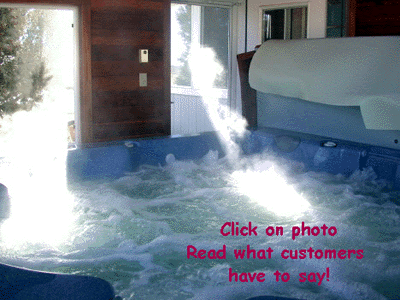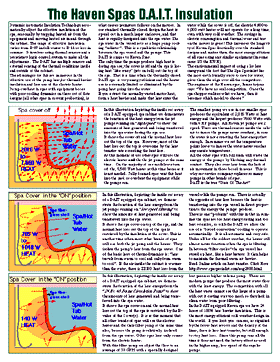|
|
Quality Spas and Hot TubsThe Spa Specialist Inc.SPA TIPS
Insulation, Heat Retention, and Freeze Damage"Promoting ethics in the spa industry." |
Thank you for visiting our site! Email us with hot tub questions  |
Monthly newsletter with great information for spa owners or prospective spa owners. Every thing from spa construction to the most modern water care methods. This is a recently updated spa care tips with some of the latest information added. published on the web by The Spa Specialist Inc.Havenmade Inc. Broomfield, CO (303) 404-AAAH! (2224) email info@spaspecialist.com copyright 1998-2008 You may down-load this for your personal use. Duplicating or publishing any part of this document for commercial use without written permission is strictly prohibited. (updated Aug 2008) Insulation, Heat Retention, and Freeze DamageI often get letters and questions from people about this subject. One of the most important question for most people is; "How much is it going to cost me?" (Read What Our customers say.) There are two answers to that question. One is the
selling
price of the spa, and the other is the cost to operate and repair the
spa
over time. You can save as much as $2500 or more over a period of ten
years
by buying a spa that costs $500 to $1000 more than other brands, simply
because
it is made better. However, not all higher priced spas are better.
Price
is not the only determining factor is spa choice. THE MOST IMPORTANT FACTOR IN COST OF OWNING AND
USING
A SPA IS: How the spa is made!! ( The second is the
price.) (Used spas are all over the place, now. The add say: "Free Spa, come take it away!") I just wanted to make that clear. It doesn't matter anything that the spa sales person says! All of those "BEST BUY" lies and so on. It is using your knowledge and common sense of spas that is the only thing keeping you from wasting your own money on a poorly designed product. You must learn about spas first before you buy one! You cannot trust anyone in the spa industry to know what they are selling you, because they don't. Even the largest of all the spa manufacturers does not know how to build a well made super energy efficient spa. Just go look at them after you learn about spas. Get a copy of the book "How Spas Are Made". Or get a copy of "Spa Secrets" from our catalog or from custombuiltspas.com. I have found, from working in spa repair for the last 15 years, that people really want a spa that doesn't cause problems and they don't like spending extra money on chemicals to clean up a poor filtering spa. When our service customers have a spa that is less than 5 years old, and the repair bill is over $1000,00, I feel bad for them. The spa company that built that piece of trash IS THE PROBLEM!. It is a real dilemma for me, because now our service company is involved. I usually recommend they get rid of the spa, and buy one of ours. If that isn't possible, then we will fix it (or, very common, it sits there for years until it goes to the dump). The four common expensive repair problems are (1) leaking, especially expensive is fully structurally foamed leaking spas, (2) burned out poorly designed equipment and (3) cracks and blisters on the surface of the spa shell or discoloration on the spa shell. Sometimes a spa will have all three problems. (4) There is one other really bad problem, freeze damage. If severe, it is the worst single problem a spa owner can have, with repairs of nearly $2,000 to find and fix all the broken jets, pipes, pumps, manifolds, heaters and blower channels and blower manifolds. Sometimes it is similar to completely rebuilding the spa, by stripping out all the parts and starting over. There is a difference between a "manufacturing defect" and defective manufacturing! If a manufacturer is using good sound engineering and manufacturing methods and an individual spa has a warranty problem, that is one thing. If the manufacturing methods are developed only to insure a high profit, and the manufacturer knows that the spa will not last for more than the length of the warranty without major problems, that is something altogether different.
|
Some spa builders have determined that by filling the
spa
cabinet full of foam, they can make a really cheap shell and support it
by foam. The sales people will tell you it is for heat retention, but
that
is not the reason for all that foam. It simply saves manufacturing
costs. One person with a spray gun and about a half an hour, and the
spa support
is built. They call it "structural integrity". I am almost sick
of
that phrase, because it is really a BS sales "buzz word" that really
has
very little meaning. They use a lot of carefully concocted
sentences
to sound good so you are driven by your emotions to buy the spa.
The
sales person's job is to feed your brain "logic" to give your emotions
the
go ahead to lay out thousands of dollars on a product that you don't
know
"diddly" about. Why are people buying a product that they don't
know
anything about, without researching???? The only thing I can
figure
is that the consumers really want one very bad (emotions) and they give
in
to the "nice" salesperson's concocted sales pitch. "Oh! That nice
salesperson
would not mislead me, would they?" You are damn right they would
at
$300 to $1500 or more in commissions. I hear that the ThirmolSpas
salesguys
get up to $3,000 in commissions if they sell the spas at those
ridiculous
prices. To a lay person, it sounds reasonable when salespeople say that a spa cabinet which is full of foam "gives the best thermal insulation", but that is far from the truth. Independent tests from Colorado State and Arizona State Universities, and my own test have shown that to be false. The best insulation is done in layers and is called thermal pane or thermo-loc. In thermal pane insulation most of the electrical energy is conserved. It is a dynamic insulation and is not measured as a stagnant R-Value. It is measured at the electric meter! There is one "catch" to thermal pane insulation. The
spa
shell has to be made strong and self supporting. It costs more to make
a
strong shell! I always ask people this question when the subject of insulation comes up: "When two inches to four inches is the thickness of the strongest foam spa cover, where the heat loss is the greatest (heat rises), why do we need so much foam on the bottom and sides where the heat loss is so small?" If a person holds a styrofoam cup in one hand and pours some boiling hot coffee in it, then places a finger in the coffee, in less than a minute, second degree burns occur. (A million dollar law suit happened this way!) When less than 1/16 inch of foam can keep the cup so cool on the outside, how is it that you need 10 to 34 inches of foam in your hot tub??? Almost all of the insulation value in a full foam spa is wasted. It is used as a low cost way to support the spa and that is all. The effect of the foam is psychological for people who know nothing about insulation, like spa sales people with no engineering training. Freeze damage is much more likely to occur in a full foam spa. If the entire cabinet is full of foam, the equipment compartment has to be vented to the outside air. (The compartment is too small for warm the air to circulate and be transferred into the spa water, so heat is lost.) When the equipment stops for any reason, the cold air in winter enters the compartment and freezes the water inside the equipment and exposed pipes. One of the most assured laws of chemistry is that water expands when it freezes. As it expands, it breaks things, namely, full foam spas' pump housings, heater housings, and any exposed pipes. If you think that full foam spa was a deal, just wait until you have to replace those items. Freeze damage is not covered by any warranty! One of my favorite things to do is to ask full foam spa sales people this question: "What will happen if the spa is left unattended for two days at zero degrees, while the electric power is off?" I have gotten some rather unusual responses, red faces, and just plain BS. One spa salesman told me that they "have self sacrificing parts that break to save the rest of the spa". I thought to myself: How noble of those parts, the heater manifold, the pump housing, and the other most expensive parts in the spa. See the Awesome Haven Spas up close! |
 Find our how to install a hot tub indoors correctly! |



